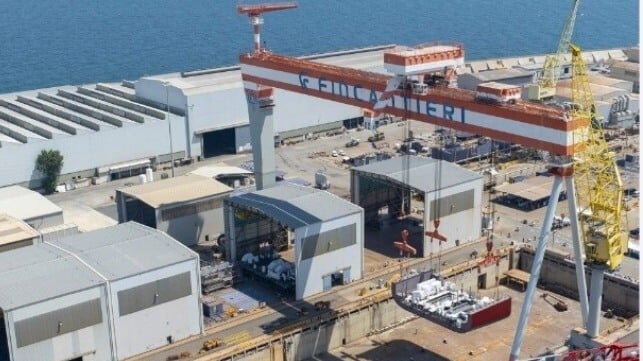Fincantieri Reports All-Time High Total Backlog of €57.7B as of Mid-Year

The Fincantieri group reported a strong financial performance in the first half of 2025, citing growth in each of its key areas of business. The company continues to follow a strategy to diversify and strengthen its role not only as a leading cruise ship builder, but also in defense, offshore, energy, and its newly launched underwater segment.
The shipbuilder has continued a strong rebound from the challenges of the pandemic, and with limited participation in commercial shipbuilding, as it is not involved in segments such as containerships or LNG carriers, which have been driving others’ growth. Order intake was strong during the first half of 2025, with the company highlighting a 93 percent increase versus 2024 to €14.7 billion ($16.8 billion). It was equal to 96 percent of the group’s total orders for all of 2024, with the shipbuilding segment of its operations driving the growth.
Fincantieri reports that as of mid-year, its backlog stands at an all-time record of €57.7 billion ($65.9 billion) with €41.9 billion ($47.8 billion) in firm orders. The committed orders increased 35 percent compared to year-end 2024 and represent more than seven times 2024 revenues. Cruise was a critical part of this, with the company reporting it had booked orders and options for a total of 21 cruise ships (Crystal Cruises, Norwegian Cruise Line, Four Seasons Yachts, and Viking), compared with 19 firm orders for cruise ships during all of 2024. However, it also points to orders from the Italian Navy and a replacement order for the Indonesian Navy, and a total orderbook of 100 vessels.
For the first half of 2025, Fincantieri reported a 24 percent increase in revenues to €4,576 million ($5,226 million). EBITDA increased 45 percent to €311 million ($355 million) with a net profit of €35 million ($40 million). It reported a total of 13 ships delivered for eight yards, including three cruise ships (Norwegian Aqua, Mein Schiff Relax, and Viking Vesta) as well as the ninth vessel in the 10-unit FREMM series.
“Our results are not merely figures, but a snapshot of a company that is turning the complexity of the global scenario into a driver of growth and value creation,” said Pierroberto Folgiero, Chief Executive Officer and Managing Director of Fincantieri. “Our industrial vision focused on long-term value generation continues, also benefiting the broader stakeholder ecosystem, with a record-level total backlog, amounting to 57.7 billion euros, that not only represents a solid foundation for future growth but also stands as proof of the trust our clients place in our ability to be strategic partners in their transformation journeys.”
Under Folgiero’s leadership, the group is expanding and diversifying as it builds on its existing cruise and defense shipbuilding as well as specialized ships, including VARD and offshore and other construction businesses. With the acquisition of Leonardo’s Underwater Armament Systems business, Fincantieri has launched a new business Underwater segment, and sees strong opportunities in the space.
Cruise remains the largest portion of the group’s business at 43 percent of total revenues. However, it continues to make progress in diversifying, while the defense sector represents 24 percent of total revenues.

that matters most
Get the latest maritime news delivered to your inbox daily.
The group also points to new initiatives, including strategic partnerships signed in Southeast Asia, including with Indonesia and Malaysia. It looks to participate in a program promoted by the Royal Malaysian Navy for the renewal of its fleet. It also took steps to expand its commercial opportunities in the Middle East. It signed new agreements in Qatar and took steps to grow, including a new office in Riyadh, to grow in Saudi Arabia.
The group said its performance in the first half of 2025 “confirms the growth trajectory and its forecast for the full year.” Revenues at expected to reach approximately €9 billion for all of 2025. It points to continued opportunities in the cruise segment as the tourism market continues to grow, as well as strong demand for offshore energy resource development. Geopolitical instability, it said, is driving increased investment in defense and critical infrastructure protection, providing a positive overall outlook for the group.
